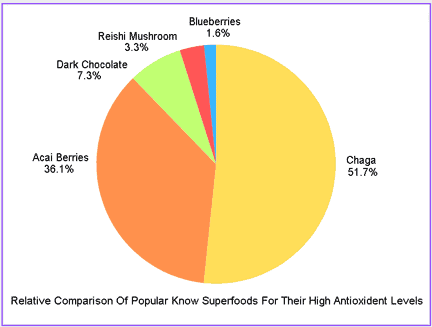Post-You May Not Know…/How Does Chaga Compare/February 18.2024
Do I Need Oxidative Stress Supplements?
What are Oxidative Stress Supplements?
 We all know we should eat better, including certain foods high in Antioxidants, but do we? When our diet is deficient in Antioxidants, Oxidative Stress causes damage to the cells in our body. Oxidative Stress Supplements are superfoods in the form of tinctures, extracts, or capsules that we can consume to supplement our regular diet and increase the Antioxidants in our body.
We all know we should eat better, including certain foods high in Antioxidants, but do we? When our diet is deficient in Antioxidants, Oxidative Stress causes damage to the cells in our body. Oxidative Stress Supplements are superfoods in the form of tinctures, extracts, or capsules that we can consume to supplement our regular diet and increase the Antioxidants in our body.
Why Do We Need Oxidative Stress Supplements?
Oxidative Stress Supplements contain high concentrations of Antioxidants, which help prevent or slow down the damage caused by free radicals in the body.
 Free radicals are unstable molecules produced during normal metabolic processes and in response to external factors like pollution, UV rays, tobacco smoke, and emotional stress.
Free radicals are unstable molecules produced during normal metabolic processes and in response to external factors like pollution, UV rays, tobacco smoke, and emotional stress.
Free radicals can cause oxidative stress, potentially contributing to cell damage and various health issues. If we were automobiles, it would be like rust. Antioxidants are crucial in neutralizing free radicals and protecting cells from oxidative damage. This is what makes Oxidative Stress Supplements so important.
What Can Oxidative Stress Supplements Do for Me?
The potential Benefits of Supplemental Antioxidants include:
1. Cell Protection: Antioxidants help protect cells from damage caused by free radicals, supporting overall cell health.
2. Immune System Support: Some antioxidants, like vitamins C and E, support the immune system, helping the body fight infections.
3. Heart Health: Antioxidants may contribute to heart health by reducing oxidative stress and inflammation associated with cardiovascular diseases.
4. Anti-aging: Neutralizing free radicals with antioxidants may help slow the aging process and reduce the appearance of aging-related conditions.
5. Cancer Prevention: While research is ongoing, some studies suggest that antioxidants play a role in stopping or slowing the growth of certain cancers.
Where Can I Find Antioxidants?
 Antioxidants are present in various foods, especially fruits, vegetables, nuts, and whole grains. Common Antioxidants include:
Antioxidants are present in various foods, especially fruits, vegetables, nuts, and whole grains. Common Antioxidants include:
1. Vitamin C: Found in citrus fruits, strawberries, bell peppers, and broccoli.
2. Vitamin E: Found in nuts, seeds, spinach, and broccoli.
3. Beta-carotene: Found in carrots, sweet potatoes, spinach, and kale.
4. Selenium: Found in Brazil nuts, fish, and whole grains.
5. Flavonoids: Found in berries, citrus fruits, onions, and tea.
6. Polyphenols: Found in green tea, dark chocolate, and various fruits and vegetables.
How Does Chaga Compare to Other Sources of Antioxidants?
Chaga is considered a Rich Source of Antioxidants, primarily due to its content of:
1. Polysaccharides (Beta-Glucans): Known for their immune-modulating effects.
2. Triterpenes: Studied for potential anti-cancer and anti-inflammatory properties.
3. Phenolic Compounds: These include flavonoids and polyphenols, known for their antioxidant effects.
Chaga’s Antioxidant profile is at the top end of Antioxidant-rich foods. See the pie chart below.

Can Aging, Emotional Stress, and Work-Related Pressure cause Oxidative Stress?
1. Aging:
• Aging has been shown to increase the production of reactive oxygen species (ROS) or free radicals, natural byproducts of cellular metabolism. Over time, the body’s ability to neutralize these free radicals can diminish, leading to oxidative stress.
• Oxidative stress in aging is linked to the cumulative damage of cellular components, including proteins, lipids, and DNA. This process plays a role in age-related conditions and the overall aging process.
2. Emotional Stress:
• Emotional stress, such as chronic psychological stress, contributes to oxidative stress and causes the body to release hormones like cortisol, which can promote the generation of free radicals.
• Chronic Stress may also affect the body’s Antioxidant defense mechanisms, reducing its ability to neutralize free radicals effectively.
3. Work Pressure:

• Work-related stress, when prolonged or chronic, can contribute to Oxidative Stress. High-pressure work environments may lead to increased levels of stress hormones and a heightened inflammatory response, which contribute to Oxidative Stress.
• Additionally, factors associated with work-related stress, such as long working hours, lack of sleep, and poor lifestyle choices, can further exacerbate Oxidative Stress.
Consequences of Oxidative Stress:
• Oxidative Stress can cause various health conditions, including inflammation, cardiovascular diseases, neurodegenerative disorders, and a compromised immune system.
• It is implicated in the aging process and age-related diseases.
• Oxidative Stress can contribute to cellular damage, DNA mutations, and the development of chronic conditions.
Managing Oxidative Stress:
• Implement a healthy lifestyle with a balanced diet rich in Antioxidants, regular physical activity, and sufficient sleep, which can help manage Oxidative Stress.
• Practices like mindfulness, meditation, and stress-reducing activities may also mitigate the impact of emotional and work-related stress.
What if Work, Kids, or Life's Challenges do not allow me the time to Cook a Balanced Diet Rich in Antioxidants, get Regular Exercise, and Meditate?
Some Oxidative Stress levels are a natural part of cellular metabolism, but chronic or excessive Oxidative Stress can harm overall health. While managing stress and adopting healthy lifestyle choices is crucial to maintaining overall well-being and minimizing health consequences, it’s not always possible.
Most busy people in the prime of their lives or older adults with arthritic pain find it hard to get the exercise they need or eat the way they should. So what do you do? While there is no substitute for a healthy lifestyle, Oxidative Stress Supplements, which are believed to be high in antioxidants, like Chaga Extract, is a great start!
![]() Chaga Golden Products offers a Chaga Extract crafted from the finest mature wild-harvested chaga from the most pristine northern latitudes. While “An Apple a Day Will Help Keep the Doctor Away” is great sage advice, it may soon need to include Chaga!
Chaga Golden Products offers a Chaga Extract crafted from the finest mature wild-harvested chaga from the most pristine northern latitudes. While “An Apple a Day Will Help Keep the Doctor Away” is great sage advice, it may soon need to include Chaga!
Return to: ChagaGolden Blog
